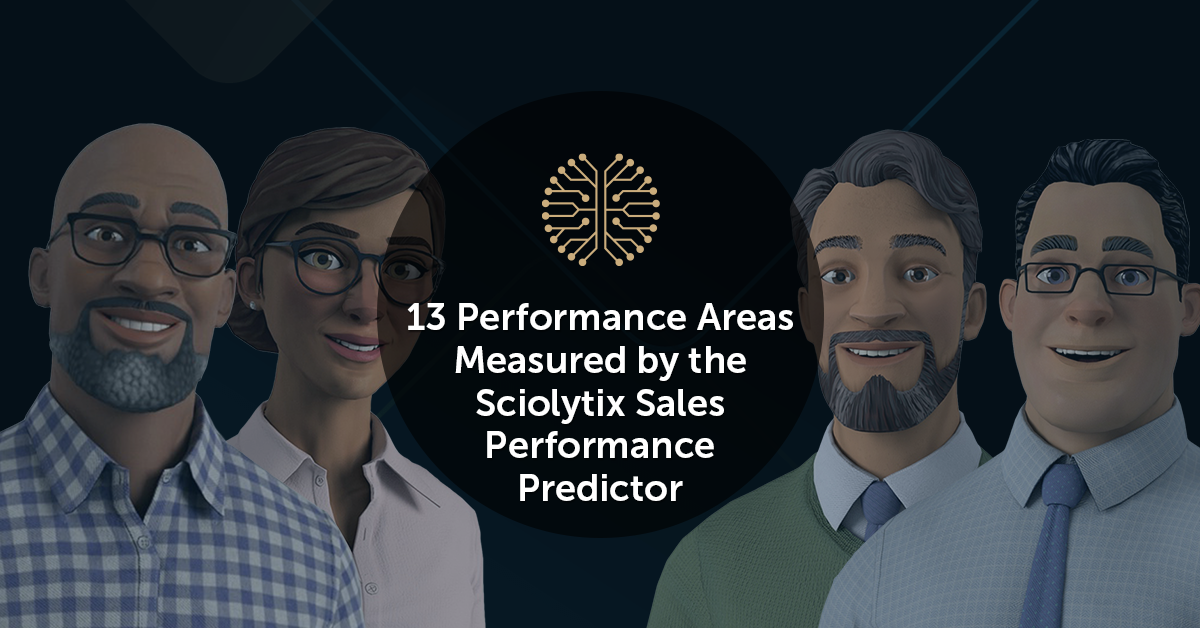
In 1964, in the Harvard Business Review, Dr.s Herb Greenberg and David Mayer published a seminal article on What Makes a Good Salesperson. In it, they identified two personality traits that are key to predicting who would succeed at sales and who would fail. These two traits, Empathy and the Need to Conquer, would become the basis of dozens of different personality tests in the years to follow. Since the 1960s, hundreds of different personality traits, behaviors, and skills have been explored to uncover better ways of identifying the next top sales performer.
When Sciolytix undertook the task of reinventing sales assessments, we wanted to build on this extensive body of research. We began with a literature review of the past 30 years of attempts to predict and explain salesperson performance. We looked at studies without giving a preference to any sales philosophy. Our goal was to identify the best predictors of performance, whether they came from research into Challenger, Consultative, Hunter/Farmer, or any other sales model. We searched through literature from multiple disciplines (psychology, business, industry, etc.) referencing the full spectrum of sales roles (new business development, account management, account retention, etc.). Our intention was to be able to create a next-generation sales assessment that could predict sales success across industry and role, and be appropriate for anyone in B2B selling, at any stage of their career.
From this literature review, we were able to identify 25 constructs that had strong predictive validity for sales success. These constructs were a mix of traits, behaviors, skills, and cognitive abilities, and they came from several different theories of selling. We examined these constructs, and identified 13 that we knew we would be able to measure using a realistic sales simulation – essentially, testing applicants and employees while they are engaged in the sales process, without the need to have them fill out multiple choice tests or play unrealistic mind games.
The 13 Performance Areas that we identified, and which are measured in S2P2 today, comprise four clusters of sales ability:
The Sales Drive Cluster
- Closing – This performance area measures the ability of the salesperson to get agreement from a prospect and guide them towards next steps.
- Negotiating – A measure of how well the salesperson can balance the needs of the prospect with their own needs to arrive at a mutually acceptable outcome.
- Persuasion – How effectively the salesperson can change the mind of the prospect, or guide the prospect towards a desired course of action.
The Empathy Cluster
- Adaptability – To what degree the salesperson adjusts their approach and their timing to match the demands of the conversation or do they stay rigid and inflexible on their agenda.
- Curiosity – A measure of how inquisitive a salesperson is – do they ask questions to learn more before sharing information, or do they stay at the surface level and move on.
- Learning – How well the salesperson listens to and processes information from the prospect, and identifies needs before offering a solution.
- Listening – Someone with a strong score in listening will adjust to information gained during the sales process and use that information effectively.
The Consultative Resource Cluster
- Comprehension – Ability to process complex information when presented during a sales conversation (re: thinking on your feet)
- Problem Solving – Applying information gathered in order to provide a resolution to a customer issue, need, or request.
- Reasoning – Ability to draw conclusions from complex information gathered and convey the meaning of information using analogies.
The Conversation Management Cluster
- Critical Decision Making – Evaluates the facts to make decisions when presented with a challenge, or do they defer the decision for another time.
- Persistence – Someone strong in persistence will hold their ground during a difficult negotiation while others will start modifying their position early and make concessions easily.
- Sales Process Awareness – The degree to which the salesperson understands the need for a basic structure to the sales process, and navigates the conversation effectively.
As we continue to gather data on salesperson performance, Sciolytix will refine and enhance our model of predicting sales success. We are committed to allowing the data to speak for itself, and to creating next-generation sales assessments that can be used across industries, roles, and selling styles.